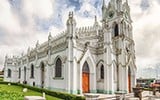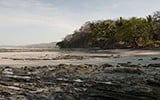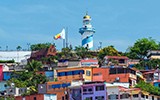As a foreigner living in Costa Rica, it is likely that you will at some point wish to open a local bank account. Read this ...
Living in Costa Rica guide for expats
All the information you need to relocate and live in Costa Rica.
Our selection of articles for expatriation in Costa Rica
Costa Rica has received international praise for its modern healthcare system, and both citizens and legal residents can enjoy ...
A low unemployment rate and a strong economy set Costa Rica apart from its neighbours. If you have fallen in love with the ...
As the country's capital, San José is home to almost half of Costa Rica's population. Read this article to find out ...
Heredia is reputed to be the safest city in Costa Rica, and the region is often referred to as the Silicone Valley of Central ...
When it comes to staying in Costa Rica, there are many options, from transit and tourist visas to temporary residence permits and ...
Located between Nicaragua and Panama, millions of foreigners travel to the 'Switzerland of Central America' every year ...
Pets are part of the family so, if you don't want to leave your furry beloved behind when you move to Costa Rica, read this ...
Travelling around Costa Rica is easy and relatively affordable, and you can take your pick of transport options, depending on ...
Everyone working in Costa Rica is subject to the same tax regulations, so no concessions are made for expatriates. Read this ...
Costa Rica is an attractive and affordable country in which to study, with one of the highest literacy rates in Latin America and ...
The government's positive attitude towards foreign investment, as well as the country's developed infrastructure, its ...
Many retirees are attracted by Costa Rica's stable democracy, excellent healthcare, enjoyable climate, natural beauty and ...
Moving to Costa Rica is exciting, but there are certain factors to consider when you're relocating that could save you time ...
You'll find close-knit https://www.expat.communities all over Costa Rica, and it's easy to understand why so many ...
About Costa Rica
Known as a bastion of stability, Costa Rica stands out from its neighbours, thanks to its sustainable tourism, developing infrastructure, and efforts in green energy. It has well-earned the moniker of being the "Switzerland of Central America", thanks to its relative economic and political stability, as well as its magnificent landscapes and natural heritage.
The name Costa Rica translates to 'rich coast', and its wealth of natural treasures can be discovered in over 100 protected areas across the country. Thanks to its enjoyable climate, pleasant people, affordable cost of living, investment opportunities, and abundance of activities available in nature, the small Central American country continues to entice foreigners in their droves to its picture-postcard places.
Geography
Costa Rica shares a border with Nicaragua to the north and Panama to the south-east, while its northeastern coastline greets the Caribbean Sea and its southwestern coastline is caressed by the Pacific Ocean.
Various geographic and ecological zones have resulted in an abundance of natural treasures, and the sheer diversity is astounding, especially considering the country's relatively small size. At 19,730 square miles, it is the second smallest country in Latin America but is home to an astounding 5% of the world's biodiversity.
Five mountain ranges (Mount Chirripo is the highest point at 12,450 feet a.s.l), cloud forests, more than 121 volcanic formations (seven of which are active), ca. 800 miles of Caribbean and Pacific coastline and 14 major river systems (two of which have famous whitewater rapids) are located in Costa Rica, even though the country is at no point more than 200 miles long or wide, and spans only 70 miles at its narrowest section.
Costa Rica essentially consists of a coastal plain that is vivisected by mountain ranges, and there are four main geographical areas ' the Tropical Lowlands, the Northern Central Plains, the Central Valley and the Northwest Peninsula.
Climate and nature
Located just 10° north of the equator, the sun rises (5.30am) and sets (5.30pm) at roughly the same time throughout the year, so there is no Daylight Savings Time.
Costa Rica has both tropical and subtropical climates, and is particularly notorious for its microclimates, as the weather can differ greatly between destinations. For example, the Highlands are significantly cooler than the Lowlands, and the Central Valley and San Jose arguably have the best climate with an average temperature of 22°C
There are two seasons in Costa Rica ' the wet season and the dry season. However, these are not the same throughout the entire country due to the five mountain ranges that run from north to south and divide the country into distinct climatic zones.
The dry season in the Pacific, Central Valley, and Northern Highlands and Lowlands tends to be from December to April, and the wet season typically lasts from May to November. Over in the Caribbean, on the other hand, the dry seasons generally comes in March and April, as well as September and October, while the wet seasons lasts from November to January, then again from May to August. The Caribbean tends to see daily tropical rains almost all year-round, and these don't tend to fall in a predictable pattern and can come at any time of the day, unlike in the Pacific where the rainfall in the wet season is fairly consistent. The North Pacific region is home to some of Costa Rica's most popular tourist destinations, and its province of Guanacaste is considered to be the driest part of the country.
Costa Rica is home to more than 5% of the world's biodiversity, although the country only takes up 0.03% of the planet's surface in terms of landmass. Costa Rica is a global leader for its environmental policies and accomplishments, and more than a quarter of the land is protected in national parks, reserves and wildlife refuges, and there are more than 100 different protected areas.
Thanks to having some of the world's most biodiverse ecosystems, wildlife abounds ' from keel-billed toucans and scarlet macaws to sloths, white-faced capuchins and howler monkeys. Blue Morpho butterflies float across the skies, while caimans, sharks, dolphins and whales thrive in the waters.
In 2012, the Environmental Performance Index (EPI) ranked Costa Rica as the world's '5th Greenest Country', and it generates 78% of its own renewable energy by hydroelectric means, while an additional 18% is generated by geothermal or wind power.
In order to achieve the goal of being entirely carbon neutral by 2021, an immense reforestation programme was initiated to help offset emissions, and Costa Rica is now the only tropical country in the world that has reversed deforestation. The government has also voted against actions, such as oil drilling and open-pit mining, which could damage the land.
Population and culture
Most of Costa Rica's 4.8 million-strong population are of European descent, while indigenous tribes make up only 1% of the total population. The official language is Spanish, although many citizens are bilingual, with English being the most common second language, and Patois (a Jamaican creole with English roots) is spoken along the Caribbean coast. If you've travelled much in the region, you may well notice that Costa Ricans speak Spanish more slowly than other Latin Americans, and they are generally very patient and encouraging with people who are trying to learn the language. Costa Ricans refer to themselves as 'Ticos' (males) or 'Ticas' (females), which reflects the linguistic tendency in the country to affectionately add the suffix 'tico' to the end of each word to imply a certain fondness, as well as a diminutive.
Although the official religion is Roman Catholicism and more than 75% of the population identifies as Catholic (although only 45% are practicing), the country's 1949 constitution guarantees freedom of religion.
Due to its relatively stable democracy, the small Central American country is often considered to be a beacon of peace amidst the violence and poverty faced in many other countries in the region. As a result, Costa Rica is the country of choice for many Latin Americans seeking work, and migration from Nicaragua to Costa Rica is particularly common, going back to the 19th-century when Nicaraguan workers were instrumental in the rise of the Costa Rican coffee and banana industry, as well as the construction of its railroad.
During and after the conflict in Nicaragua in the 1980s, many Nicaraguans also fled to Costa Rica for political and economic reasons, then many more sought refuge after Hurrican Mitch destroyed infrastructure and harvests in Nicaragua in 1998, leaving millions homeless. As a result of these various economic, political and environmental events, approximately 10% of the population in Costa Rica is now Nicaraguan, but unfortunately, there are issues with xenophobia, and there has been a considerable crackdown on the influx of illegal immigrants.
Economy
Costa Rica is the most prosperous of the Central American Common Market's five countries (it has one of the lowest poverty rates in Latin America and the Caribbean) and has one of the highest levels of foreign direct investment per capita in Latin America. Considered to be an upper middle-income country, according to the World Bank, Costa Rica has experienced steady economic expansion over the past 25 years thanks to an openness to foreign investment and gradual trade liberalisation.
Interestingly, Costa Rica is one of the world's largest exporters of microchips and is often referred to as the Silicon Valley of Latin America (Intel, IBM and Microsoft have distribution facilities in the country).
Trade plays a significant role in Costa Rica's economy ' the combined value of exports and imports equates to 64% of GDP. Although traditional agricultural exports of bananas, pineapples, coffee, sugar and beef still form the backbone of the country's commodity-driven exports, foreign investment has created a shift in the economy from agriculture, to services and technology. Microchips and software development are now leading industries, and tourism further bolsters the economy. As one of the most popular tourist destinations in the region, Costa Rica is particularly regaled for its efforts in ecotourism.
In the 2018 Index of Economic Freedom, Costa Rica ranked as the 57th freest country, with a score that is above world averages. According to the index, 'macroeconomic stability, strong institutions, policy predictability, a fairly well-educated workforce, and a favorable stance toward trade and private foreign direct investment underpin Costa Rica's attractive business environment.'
Politics
Costa Rica has a long history of democratic stability and tolerance and has often been seen as an island of tranquillity in a sea of civil warfare. Its 1949 constitution established a fair judicial system and an independent electoral body, gave women the right to vote, and provided other social and economic guarantees for all citizens. In 1949, Costa Rica also abolished its army and opted to recruit forest rangers and teachers instead of infantry. Costa Rica has enjoyed democratic elections since this time and, in 1987, President Oscar Arias Sanchez was awarded the Nobel Peace Prize.
In the recent 2018 election, division almost became the new narrative (the election has been described as a battle between progressive and conservative values), but Costa Rica proved itself to be a country that celebrates peace, democracy and unity when Carlos Alvarado Quesada, a novelist and former labour minister from the centre-left Citizens' Action Party, defied the pre-election predictions by becoming the new president.
Costa Ricans tend to have a deep respect, trust and pride in the country's longstanding democratic processes, and Costa Rica ranks 'very high' in perceptions of electoral integrity, according to the Electoral Integrity Project.
Useful links:
Expat.com ' Costa Rica Forum
Costa Rica Tourism Board www.visitcostarica.com












